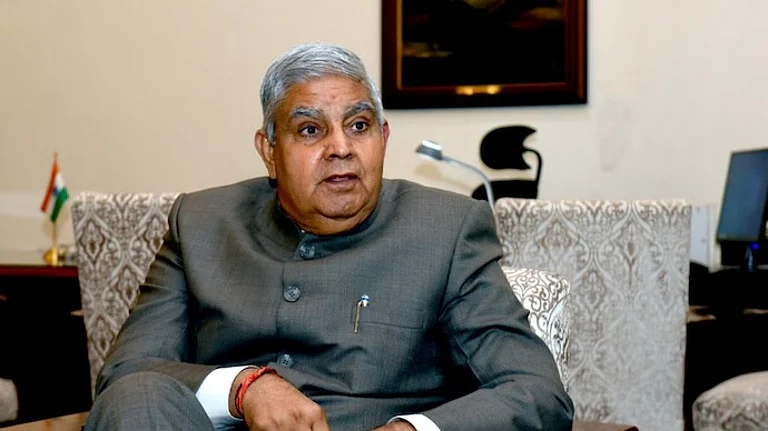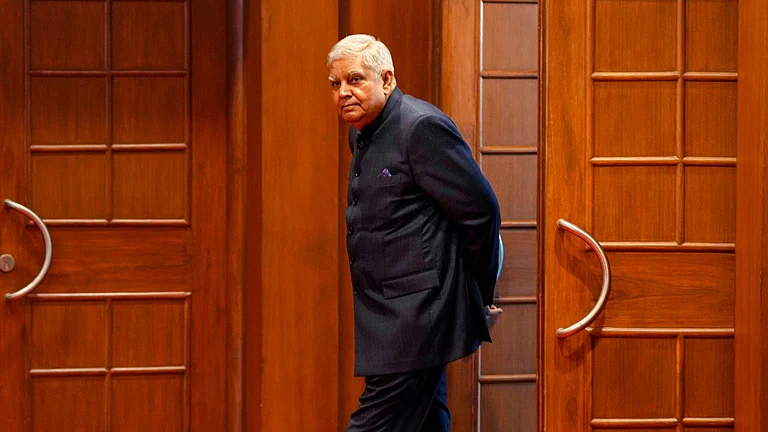In an unexpected move, Vice President Jagdeep Dhankhar resigned from his post on Monday evening, citing medical reasons. The sudden development inevitably triggered several speculations within the political sphere.
VP Dhankhar Resigns: What Happens When A Vice-President Steps Down Mid-Term?
In his resignation letter to President Droupadi Murmu, the Vice-President, who recently underwent angioplasty at the All India Institute of Medical Sciences (AIIMS), said he was stepping down with immediate effect to 'prioritise health care'.
In his resignation letter to President Droupadi Murmu, the Vice-President, who recently underwent angioplasty at the All India Institute of Medical Sciences (AIIMS), said he was stepping down with immediate effect to 'prioritise health care', as per PTI.
"To prioritise health care and abide by medical advice, I hereby resign as Vice President of India, effective immediately, in accordance with Article 67(a) of the Constitution", Dhankhar's letter read.
The seventy-four-year-old veteran politician assumed office in August 2022, and his tenure was till August 2027. With this move, Dhankhar becomes the third Vice-President in India’s history to resign before completing his term, after V.V. Giri and R. Venkataraman.
Here's a look at what happens next when a vice president resigns mid-term.
Who Becomes The Caretaker Vice-President?
The 온라인카지노 Constitution does not have any provision for an acting Vice-President.
However, since Dhankhar also held the position of the ex-officio Chairman of the Rajya Sabha, the current Deputy Chairman, Harivansh Narayan Singh, reportedly will preside over the House in his absence.
About The Next Election To Choose VP
Under the Constitution of India, the election of the vice president is governed by Articles 63 to 71 and the Vice-President (Election) Rules, 1974.
While in the case of the President, the Constitution has a mandate of six months to hold the next election, for a Vice-Presidential vacancy, there is no such fixed deadline.
The only requirement in this case is that the election be held 'as soon as possible' after the post falls vacant. The Election Commission will announce the schedule.
The BJP-led NDA and INDIA bloc are expected to announce their candidates in the coming days.
Who Can Contest The Election?
As per rules, a person contesting for the post of Vice-President must be at least 35 years old, a citizen of India, qualified to be elected to the Rajya Sabha, and registered as an elector in any parliamentary constituency.
None of the candidates should hold any office of profit under the central or state governments, except positions like President, Governor, or Minister.
How Is A New Vice-President Elected?
Under Article 66, the new vice president is elected by an electoral college made up of members from both Houses of Parliament - Lok Sabha and Rajya Sabha. However, unlike in a presidential election, state legislatures do not participate.
Voting is held in Parliament House in New Delhi, by secret ballot, using the system of proportional representation with a single transferable vote. Each MP casts a vote by ranking candidates in order of preference. All votes carry equal value.
To be declared elected, a candidate must reach a required minimum number of votes. This is calculated by dividing the total number of valid votes by two and adding one (fractions, if any, are ignored).
If no candidate crosses the quota in the first round, the one with the fewest first-preference votes is eliminated, and their votes are transferred to the remaining candidates based on second preferences. The process continues until one candidate crosses the quota.

